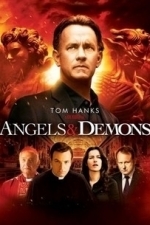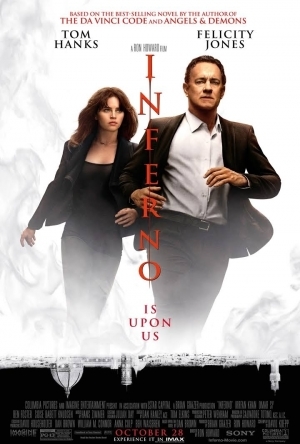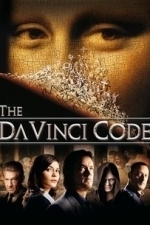Search
Search results
David McK (3695 KP) rated Angels & Demons (2009) in Movies
Mar 20, 2019
Ron Howard's take on the Dan Brown book of the same name, with that book actually being the first (albeit less famous) of his Harvard symbologist Robert Langdon mystery novels (The Da Vinci code being the more famous).
Like the book, this takes place almost entirely in Rome, with Langdon (Tom Hanks) in a race against time and through the city to unravel the mysteries of the Illumunati during the period immediately after the death of the Pope but before the choosing/ordination of the next.
Also starring Ewan McGregor playing an Irish priest, I have to say that this - unfortunately - didn't really had my attention all that much (although I did have fun playing 'been there! seen that!)
Like the book, this takes place almost entirely in Rome, with Langdon (Tom Hanks) in a race against time and through the city to unravel the mysteries of the Illumunati during the period immediately after the death of the Pope but before the choosing/ordination of the next.
Also starring Ewan McGregor playing an Irish priest, I have to say that this - unfortunately - didn't really had my attention all that much (although I did have fun playing 'been there! seen that!)
Bob Mann (459 KP) rated Inferno (2016) in Movies
Sep 29, 2021
Infernal
Dan Brown has had a bad rap over the years from snobbish reviewers who dismiss his work as “trash”. I’m sure to a large degree the multi-millionaire Dan Brown couldn’t give a toss! I personally enjoyed both the books and Ron Howard’s films of “The Da Vinci Code” and “Angels and Demons” as glossy escapism. Occasionally though books will generate a “WHHAAAT??” moment and Brown’s 2013 novel “Inferno” generated just such a response in its dramatic conclusion… and (for me at least) not in a good way. As someone always looking at script potential in books, the words “unfilmable” came to mind. So veteran screenwriter David Koepp (“Jurassic Park”, “Mission Impossible”, “Spiderman”) is to be congratulated in ‘adapting’ the story to provide a coherent screenplay.
But unfortunately it’s still arrant nonsense.
The film starts in promising style with famed symbologist Robert Langdon (Tom Hanks) waking in hospital to horrific visions of hell on earth with only the attractive young nurse Dr Sienna Brooks (Felicity Jones) to soothe his nerves. A serious head wound prevents him from remembering the last 48 hours which makes it a bit tricky when a “Terminator”-style female cop (the striking Romanian actress Ana Ularu) arrives to try to kill him. Fleeing the scene, Langdon follows a typically convoluted trail of puzzles in a race to find the location of the source of a plague that if released will devastate the world’s population. In the process he has to dodge police, World Health Organisation (WHO) staff and members of a shadowy “private security organisation” trying to catch him.
The problem with the story is that it has a plague-sized hole in its plot. The actions of the main protagonist of the film, Bertrand Zobrist (Ben Foster, “The Program”), make absolutely zero sense. If he wanted to achieve his aims he would have just done it! (“No, Mr Bond – I won’t shoot you now”). Laying a devious cryptic trail for others to follow makes even less sense, particularly as he is even seen (in flashback) to be not very good at that! Quite bonkers!
Unfortunately, the more you ponder the story, the worse it gets, and it is this that fatally drags the film down despite all the good work that Hanks, Jones and director Ron Howard try to counter-balance it with.
For there are elements on the positive side of the scales. The Italian and Turkish scenes (in Florence, Venice and Istanbul) are gloriously filmed with lush colours and exotic and evocative locations. Tom Hanks is as solidly reliable as ever in the Langdon role, and its great to see Felicity “The Theory of Everything” Jones in a leading role before she disappears into obscurity again (humour: “Rogue One” is released in December).
Tom Hanks
The film has fun with romantic expectations of the Langdon and Brooks characters. Here though is Hanks with the more age-appropriate Knudsen.
The supporting cast is also of great quality. Sidse Babett Knudsen (“Borgen”) is Dr Sinsky, leader of the W.H.O. (not credited – as memorably done with Peter Capaldi in “World War Z” as “Doctor, W.H.O.”!). Irrfan (“Jurassic World”) Khan is striking as the mysterious and authoritarian “Provost”. And Omar Sy (who made such an impact in the brilliant “The Intouchables”) plays the lead W.H.O. officer in pursuit of Langdon.
Hans Zimmer again provides the soundtrack, with his beautiful series theme cleverly working its way into the music as Langdon’s memory returns. However, at various points the music become overtly noticeable, intrusive and not to my liking. A bombastic choral reworking of the theme over the end titles is stirring though.
In summary, a glossy and nonsensical disappointment.
But unfortunately it’s still arrant nonsense.
The film starts in promising style with famed symbologist Robert Langdon (Tom Hanks) waking in hospital to horrific visions of hell on earth with only the attractive young nurse Dr Sienna Brooks (Felicity Jones) to soothe his nerves. A serious head wound prevents him from remembering the last 48 hours which makes it a bit tricky when a “Terminator”-style female cop (the striking Romanian actress Ana Ularu) arrives to try to kill him. Fleeing the scene, Langdon follows a typically convoluted trail of puzzles in a race to find the location of the source of a plague that if released will devastate the world’s population. In the process he has to dodge police, World Health Organisation (WHO) staff and members of a shadowy “private security organisation” trying to catch him.
The problem with the story is that it has a plague-sized hole in its plot. The actions of the main protagonist of the film, Bertrand Zobrist (Ben Foster, “The Program”), make absolutely zero sense. If he wanted to achieve his aims he would have just done it! (“No, Mr Bond – I won’t shoot you now”). Laying a devious cryptic trail for others to follow makes even less sense, particularly as he is even seen (in flashback) to be not very good at that! Quite bonkers!
Unfortunately, the more you ponder the story, the worse it gets, and it is this that fatally drags the film down despite all the good work that Hanks, Jones and director Ron Howard try to counter-balance it with.
For there are elements on the positive side of the scales. The Italian and Turkish scenes (in Florence, Venice and Istanbul) are gloriously filmed with lush colours and exotic and evocative locations. Tom Hanks is as solidly reliable as ever in the Langdon role, and its great to see Felicity “The Theory of Everything” Jones in a leading role before she disappears into obscurity again (humour: “Rogue One” is released in December).
Tom Hanks
The film has fun with romantic expectations of the Langdon and Brooks characters. Here though is Hanks with the more age-appropriate Knudsen.
The supporting cast is also of great quality. Sidse Babett Knudsen (“Borgen”) is Dr Sinsky, leader of the W.H.O. (not credited – as memorably done with Peter Capaldi in “World War Z” as “Doctor, W.H.O.”!). Irrfan (“Jurassic World”) Khan is striking as the mysterious and authoritarian “Provost”. And Omar Sy (who made such an impact in the brilliant “The Intouchables”) plays the lead W.H.O. officer in pursuit of Langdon.
Hans Zimmer again provides the soundtrack, with his beautiful series theme cleverly working its way into the music as Langdon’s memory returns. However, at various points the music become overtly noticeable, intrusive and not to my liking. A bombastic choral reworking of the theme over the end titles is stirring though.
In summary, a glossy and nonsensical disappointment.
Gareth von Kallenbach (980 KP) rated The Da Vinci Code (2006) in Movies
Aug 14, 2019
No film since “The Last Temptation of Christ” has invoked as much controversy as The Da Vinci Code based on the book of the same name by Dan Brown. Prior to the film even being screened for the press, cries ran out to ban the film and its message that some find blasphemous. Fortunately calmer heads have prevailed and the film by Director Ron Howard has arrived in a wash of media frenzy not seen since Mel Gibson’s The Passion of the Christ.
If you are seeing a pattern forming, you would be correct as it seems that few topics can raise ire and wrath more than the topic of religion, especially if the film proposes a viewpoint that differs from the traditional beliefs that are given by the church, bible, and history.
In the film, a monk appears to murder an elderly man who with his last ounces of strength, manages to leave a cryptic riddle on his body. The bizarre nature of the crime prompts French police inspector Fache (Jean Reno) to travel to the Louvre to investigate the crime. A clue at the crime scene causes the police to summer Robert Langdon (Tom Hanks) from a lecture hall where he is signing his latest book on symbols. Since the deceased was supposed to meet Langdon earlier in the day Langdon has fallen under suspicion for the crime.
As he attempts to decipher the message at the crime scene, Langdon encounters a police cryptologists named Sophie (Audrey Tautou), who informs Robert that he is in danger and soon the duo are fleeing from the police after deciphering some hidden clues at the crime scene.
Before either Robert or Audrey knows what is happening, they are being accused of multiple murders and on the run. As the clues begin to mount, the mystery takes an even stranger turn by the discovery of an artifact that when unlocked, should contain a map.
Seeking refuge and help, the duo arrive at the estate of Sir Leigh Teabing (Sir Ian Mc Kellen), who proceeds to tell Robert and Sophie that the clues they have uncovered are part of a cover-up that segments of the church will stop at nothing to keep secret. The nature of this secret is such that should it become public knowledge, then they very foundations of history, faith, and the church could be shaken to their core.
As the mystery becomes clearer, the group are attacked by a Monk named Silas (Paul Bettany), who has been doing the violent work of someone know as The Teacher in an effort to discover the location of artifacts and those attempting to uncover the mystery.
What follows is a frantic race that travels from Paris to London in an effort to get to the bottom of the mystery and unravel the true nature of the mystery and the secret that people are willing to kill for in order to protect.
While some may find the mystery, the players, and their motivations confusing, the film does grab hold and moves along at a solid pace. Ron Howard once again shows his skill by directing a film that is different from his other works, yet rich in its visuals and complexity. The scenic locales of the film enhance the mystery (For those who have not read the book), as they attempt to decipher the clues along with the characters.
The work from the cast was solid as Hanks gives a very good if restrained performance in his portrayal. Mc Kellen is a very nice blend of elegance and old world charm that lifts up every scene in which he is in.
While there are those who will lambaste the film for the message it provides, I chose to look at it as a film that does what movies should, entertain and make you think. The film is not saying its assertions are hard and cold facts, what it is doing is providing a vehicle for debate.
In college I was told that through debate comes knowledge and growth for a society. This was common in ancient Greek and Roman society where issues of the day would be debated in open forums. It seems that we as a society have become too insistent to take things at face value and have forgotten that the very nature of the human experience is to question, grow, and seek our own answers. As such the film is a great example of how Hollywood at times gets it right and provides solid entertainment that will stimulate as well as entertain.
If you are seeing a pattern forming, you would be correct as it seems that few topics can raise ire and wrath more than the topic of religion, especially if the film proposes a viewpoint that differs from the traditional beliefs that are given by the church, bible, and history.
In the film, a monk appears to murder an elderly man who with his last ounces of strength, manages to leave a cryptic riddle on his body. The bizarre nature of the crime prompts French police inspector Fache (Jean Reno) to travel to the Louvre to investigate the crime. A clue at the crime scene causes the police to summer Robert Langdon (Tom Hanks) from a lecture hall where he is signing his latest book on symbols. Since the deceased was supposed to meet Langdon earlier in the day Langdon has fallen under suspicion for the crime.
As he attempts to decipher the message at the crime scene, Langdon encounters a police cryptologists named Sophie (Audrey Tautou), who informs Robert that he is in danger and soon the duo are fleeing from the police after deciphering some hidden clues at the crime scene.
Before either Robert or Audrey knows what is happening, they are being accused of multiple murders and on the run. As the clues begin to mount, the mystery takes an even stranger turn by the discovery of an artifact that when unlocked, should contain a map.
Seeking refuge and help, the duo arrive at the estate of Sir Leigh Teabing (Sir Ian Mc Kellen), who proceeds to tell Robert and Sophie that the clues they have uncovered are part of a cover-up that segments of the church will stop at nothing to keep secret. The nature of this secret is such that should it become public knowledge, then they very foundations of history, faith, and the church could be shaken to their core.
As the mystery becomes clearer, the group are attacked by a Monk named Silas (Paul Bettany), who has been doing the violent work of someone know as The Teacher in an effort to discover the location of artifacts and those attempting to uncover the mystery.
What follows is a frantic race that travels from Paris to London in an effort to get to the bottom of the mystery and unravel the true nature of the mystery and the secret that people are willing to kill for in order to protect.
While some may find the mystery, the players, and their motivations confusing, the film does grab hold and moves along at a solid pace. Ron Howard once again shows his skill by directing a film that is different from his other works, yet rich in its visuals and complexity. The scenic locales of the film enhance the mystery (For those who have not read the book), as they attempt to decipher the clues along with the characters.
The work from the cast was solid as Hanks gives a very good if restrained performance in his portrayal. Mc Kellen is a very nice blend of elegance and old world charm that lifts up every scene in which he is in.
While there are those who will lambaste the film for the message it provides, I chose to look at it as a film that does what movies should, entertain and make you think. The film is not saying its assertions are hard and cold facts, what it is doing is providing a vehicle for debate.
In college I was told that through debate comes knowledge and growth for a society. This was common in ancient Greek and Roman society where issues of the day would be debated in open forums. It seems that we as a society have become too insistent to take things at face value and have forgotten that the very nature of the human experience is to question, grow, and seek our own answers. As such the film is a great example of how Hollywood at times gets it right and provides solid entertainment that will stimulate as well as entertain.


